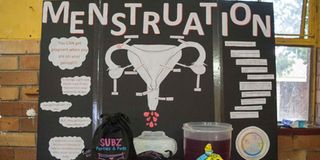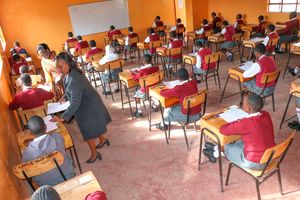Call for enhanced period poverty war in pastoral areas

A poster used to educate girls about menstruation and female reproductive system.
What you need to know:
- Ten girls in West Pokot fail to go to school for four days every month, meaning they miss 36 school days in nine months because of lack of sanitary towels.
- World Vision girl child protection officer Teresa Cheptoo said girls from low-income families are missing school during their periods as they cannot afford sanitary protection.
Many girls in pastoral communities are dropping out of school because of period poverty.
Their inability to acquire sanitary pads has also been blamed for absenteeism. Many girls in remote areas experience hardship.
For instance, in West Pokot County, the high number of school dropouts has been attributed to lack of facilities, information and sanitary products; embarrassment of leaks; or the pain and discomfort of using rags.
This demoralises the and affects their learning, hence education standards decline.
World Vision girl child protection officer Teresa Cheptoo said 10 girls in the county fail to go to school for four days every month, meaning they miss 36 school days in nine months because of lack of sanitary towels.
She said girls from low-income families are missing school during their periods as they cannot afford sanitary protection. Ms Cheptoo challenged the national and county governments, as well as nongovernmental organisations, to help schoolgirls in pastoral areas with sanitary towels for them to learn without disruptions.
Sensitisation
Speaking last week during a girls’ sensitisation meeting in the Alale area, Ms Cheptoo said sanitary towels are a necessity, especially for girls in remote areas that have been marginalised.
Ms Cheptoo urged the government to put up measures that will help girls to get sanitary towels.
“Many girls sit at home because they lack sanitary towels. We, as leaders, must intervene to address this problem,” she said.
“As learners need books and pens, girls need sanitary towels. We want them to have many so that they learn well.”
Ms Cheptoo said many parents don’t know the importance of the pads and fail to buy for their daughters. “Many parents are illiterate, hence don’t understand the importance of sanitary towels. The national government and county should chip in and help girls get the towels.”
Pokot Girl Child Network coordinator Teresa Lokichu said there is a need for stakeholders to join hands in promoting girls’ education.
“We should join hands in the fight against retrogressive culture that has no value in modern society,” she said.
Mrs Lokichu observed that many girls have dropped out of school because of the retrogressive practices.
“We want everybody to promote girl child education as girls have been denied the chance to participate in development.”
She said girls should be given an opportunity to learn to promote the two thirds gender rule. “Girls, and women in general, should be supported to take up leadership positions.”
Legal protection
She called on leaders to advocate the anti-FGM law so that perpetrators are arrested and prosecuted.
“The law is clear and those still perpetrating the vice should be sent to jail.”
Mrs Lokichu urged the county government to set aside funds for buying sanitary towels and distribute them to schools. “One towel costs Sh40-50, hence girls use them on a daily basis.”
She said many schools are mixed, hence girls fear attending lessons during their menses. “In many areas, you can travel over 50 kilometres without coming across a shop that sells sanitary towels. This had discouraged many girls from attending school. CDF was forced to chip in and rescue the girls.”
Residents called on the county government to provide sanitary towels to avert the challenges girls face.
“Schoolgirls should be provided with sanitary towels for them to learn without problems,” said Chepkatar Lomada, a resident.
They further called on the county and national governments to offer bursaries to girls to promote their education.
“Our girls have not received bursaries; we urge the county government to intervene,” said Evelyn Chelagat.





